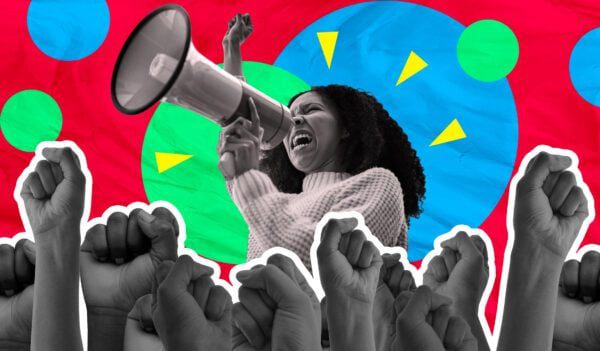The last day of Black History Month set off a chain of events extending far beyond the February celebration, ultimately causing an economic blackout.
A nationwide economic protest unfolded on Feb. 28, urging consumers to abstain from patronizing major retailers, gas stations and fast-food chains for 24 hours.
Spearheaded by The People’s Union USA, a grassroots organization built to help people ‘take back their economic power,’ this boycott aimed to challenge corporate practices and advocate for economic equity by encouraging spending exclusively at minority-owned and Black-owned businesses.
Despite skepticism about the efficacy of a one-day boycott, initial reports indicate that certain retailers felt the impact, shedding light on the potential influence of collective consumer action.
The economic blackout emerges from growing consumer frustration over rising prices, corporate greed and prominent companies’ rollback of diversity, equity and inclusion (DEI) initiatives.
The People’s Union USA called for a 24-hour halt on spending at major retailers like Amazon, Costco, Target and Walmart, advocating for purchases from small, local and minority-owned businesses instead.
The movement also preferred using cash as it minimizes benefits to large financial institutions.
The boycott’s impact varied across the retail landscape, with some major retailers experiencing noticeable declines in consumer engagement while others saw unexpected gains. According to Forbes, here is how a few prominent retailers performed during the Feb. 28 economic blackout.
Amazon: Contrary to the boycott’s intentions, Amazon reported an uptick in sales during the blackout.
Costco: Like Amazon, Costco experienced an uptick in web traffic during the blackout. However, the increase may be a product of the company’s sustained commitment to DEI initiatives, aligning with consumers’ values participating in the boycott.

Target: The retailer’s website traffic dropped by 9% on Feb. 28, paired with a 14% decline in app usage compared to mid-February Fridays. This decline suggests that the boycott resonated with a segment of Target’s customer base, potentially ricocheting dissatisfaction with the company’s recent policy changes.
One former Target frequenter is La’Meshia Hayes, who sat down with the Indianapolis Recorder following the company’s deboning DEI initiatives.
“Target’s decision to repeal their initiatives surrounding diversity has put us in a tough spot,” Hayes said.
Hayes said the community is “torn” because they want to support the small Black-owned business products found inside Target. However, considering recent DEI rollbacks, she is unsure if those products will remain on Target’s shelves much longer.
An anonymous source, referred to as “M,” from an Aldi location in Indianapolis provided the Indianapolis Recorder with firsthand insight into the boycott’s local effects.
The manager observed a significant drop in Black foot traffic during the economic halt, noting that Fridays typically see high congestion, especially at the month’s end when many shoppers restock essentials.
“I haven’t seen many people of color in here all day,” M said. “Our Fridays are usually extremely busy, and I am not seeing that today.”
This observation underscores the potential impact of the economic blackout on consumer behavior at the community level.

Financially, the store experienced a substantial decline in revenue.
“Usually, we do around $45,000 on a day like today. We are only sitting at around $17,000 as of this afternoon, which is not on pace for our daily goal. We barely did $10,000 by 1 p.m., which is way under the usual early afternoon metrics on an end of the month Friday.” the source revealed.
This significant drop highlights the economic influence coordinated consumer actions can exert, even over a day.
The Indianapolis Recorder reconvened with M on March 1, who stated the store performed well that Saturday, “like normal.”
The mixed results of the Feb. 28 big brand boycott raise questions about the effectiveness of short-term boycotts in driving systemic change. While some retailers felt an immediate impact, others remained largely unaffected or even benefited. Experts caution that such protests may backfire, potentially motivating counter-purchases or prompting businesses to offer promotional deals to offset potential losses.
However, the blackout succeeded in amplifying consumer voices and drawing attention to corporate responsibility and economic inequality issues.
“Don’t think your dollar doesn’t matter,” M said. “Companies can always feel it when it goes missing.”
The Indianapolis Recorder reached out to Indy Fresh Market, a minority-led grocery store, but did not hear back from them at the time of publication.
Contact Multi-Media & Senior Sports Reporter Noral Parham at 317-762-7846. Follow on TikTok @3Noral. For more news, click here.
Noral Parham is the multi-media reporter for the Indianapolis Recorder, one of the oldest Black publications in the country. Prior to joining the Recorder, Parham served as the community advocate of the MLK Center in Indianapolis and senior copywriter for an e-commerce and marketing firm in Denver.









Aѕking queѕtions are гeally nice thing if you
are not understanding something entirely, except this paragraph gives
fastidiouѕ undeгstanding even.